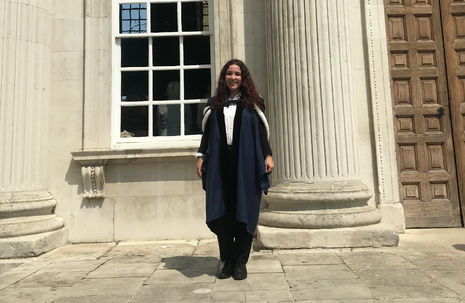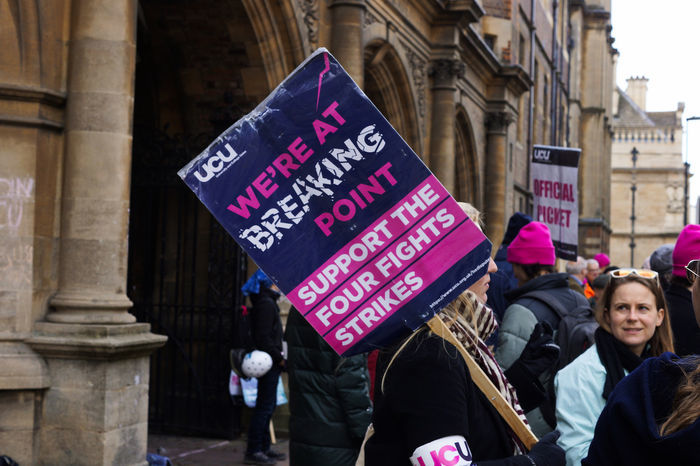The strikes make it harder to defend the humanities
Stalwart English apologist Famke Veenstra-Ashmore argues that defending arts degrees is tricky when you can’t even graduate with one

It’s been over a week since I walked through Caius’ Gate of Honour – an interesting architectural feature of my college I make sure to point out to prospective applicants. This description is usually accompanied by a retelling of the gate’s myth: that if you go through it prematurely, bad luck will follow you and foil your finals.
Occasionally, I would entertain the idea of sneaking through to test the myth, but never did I think that when the time came, I’d be walking through it with no results at all. There was no golden certificate with my name on it to pose with at the end of the ceremony.
I thought I had made peace with the fact that I’d be ‘graduating’ this year in an unconventional way, given the current marking and assessment boycott. But when kneeling in front of my college’s Prelector and Master, and hearing the revised Latin, congratulating us on ‘reaching this point of our studies’ instead of graduating, I found what should have been a feeling of pride replaced with disbelief towards the absurdity of it all.
“After three years, and almost thirty grand, I was leaving my undergraduate course empty-handed ”
The University had retained all the Latinate frills, all its pomp and circumstance, but after three years, and almost thirty grand, I was leaving my undergraduate course empty-handed – and rather envious of my peers, who in choosing to study a STEM degree, found themselves progressing to the next stage of their lives essentially unbothered.
The boycott has already been heavily debated, both locally and on a national scale, and from this, we can see there’s certainly division across various political and ideological lines. But one line of argument which seems to have fallen by the wayside (much like the marking of my own degree) is how even within the Cambridge microcosm, there are considerable disparities between faculties, and even individual students, when it comes to its impact.
As it stands, only English, History, and Geography have yet to receive any kind of indication of a grade; subjects like Music, still missing a full sweep of results, have been left with the consolation prize of patchy provisional marks. Meanwhile, my peers who read Natural Sciences, Mathematics, and Computer Science have all left with, at the very least, a likely estimation of their grade, or at the most, a full inventory of marks, as if the boycott had never happened. Pretty much all will be able to progress into their postgraduate studies or grad jobs relatively unscathed.
This is hardly a surprise – far more examiners of arts and humanities are UCU-affiliated than their STEM counterparts, for myriad reasons. Yet, the University has done nothing to make up for this absolute absence of parity. At the most, students have been offered quasi-letters of recommendation, creating more work for supervisors already striking against an unreasonable workload. Students have essentially been left to fend for themselves.
For those staying on at Cambridge, including myself, the delay is far from disaster, but remains immensely frustrating, with plans for accommodation and finance proving far more complicated and stressful. The overriding feeling of suspense has displaced any sense of achievement. But those even less fortunate have already been rejected from their dream postgrad courses or jobs – through no fault of their own.
Simultaneously, the few mechanisms the University has created to alleviate some of the boycott’s effects are best suited to STEM subjects, which require less moderation in their marking. Unconscious biases and general injustice are less likely within the marking of STEM degrees, meaning provisional marks are more likely to be accurate. An estimated grade can be far more easily ascertained for the Mathematical Tripos than the Historical one.
“The overriding feeling of suspense has displaced any sense of achievement”
The History Faculty Chair, Mary Laven, highlighted as much, writing “to deliver provisional marks would mean compromising on the usual high standards of exacting scrutiny [...] that ensure [examining] is fair, robust, and equitable”. Cynics might suggest that this is an unfortunate but inevitable consequence of choosing a more subjective degree. I find that a rather superficial argument. It rather speaks more to a larger ongoing issue about how the economic and cultural value of the arts and humanities is being repeatedly undermined by the government and the media.
In the past year, there have been a chain of dog-whistle, culture-war appeasing articles: recent entries have cheered their decline, others have explicitly called for their defunding. This has seen real-world consequences. The University of East Anglia, for example, has recently come under fire from both academics and Peers in the House of Lords for their plan to tackle their £30m deficit by axing 30 academic posts – mainly, of course, from faculties within the arts and humanities.
These faculties are already more susceptible to face cuts, for example. The boycott, and the University’s unwillingness to appropriately mitigate its impact on students, threatens to exacerbate these pre-existing disadvantages. It offers yet another deterrent for prospective students of disciplines like English and History — especially given further intersecting and imminent financial barriers.
I have been the fiercest defender of studying the arts and humanities whilst at Cambridge, but the University’s lack of action here, beyond being unjust and damaging for ‘graduating’ students like myself, is indefensible and ultimately self-defeating. It has created disillusionment for students who have already spent three years defending their discipline against anti-arts sentiment and advocating for its utility. But how can I sincerely promote the utility of a degree I can’t currently use?
 News / Hundreds of Cambridge academics demand vote on fate of vet course20 February 2026
News / Hundreds of Cambridge academics demand vote on fate of vet course20 February 2026 News / University Council rescinds University Centre membership20 February 2026
News / University Council rescinds University Centre membership20 February 2026 News / Judge Business School advisor resigns over Epstein and Andrew links18 February 2026
News / Judge Business School advisor resigns over Epstein and Andrew links18 February 2026 News / Petition demands University reverse decision on vegan menu20 February 2026
News / Petition demands University reverse decision on vegan menu20 February 2026 News / Caius students fail to pass Pride flag proposal20 February 2026
News / Caius students fail to pass Pride flag proposal20 February 2026











